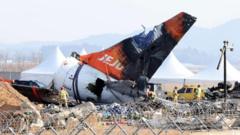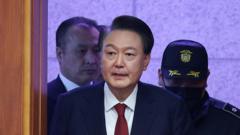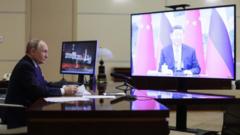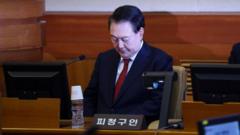As South Korea navigates an unprecedented political crisis fueled by consecutive impeachments, the newly appointed acting president, Choi Sang-mok, faces significant challenges, including a recent plane crash.
South Korea Faces Leadership Crisis Amid Political Turmoil

South Korea Faces Leadership Crisis Amid Political Turmoil
Political instability deepens as South Korea's acting president confronts a nation in turmoil.
In an extraordinary turn of events, South Korea finds itself confronting a profound leadership crisis. Choi Sang-mok, appointed as acting president just last Friday, has experienced his first major test following the recent plane crash which has unfolded amidst a political maelstrom. Tragedy struck approximately 190 miles from Seoul, leading Choi to promptly mobilize government assets and personnel for rescue operations.
This turmoil originated from President Yoon Suk Yeol’s controversial declaration of martial law earlier this month, igniting nationwide protests and marking the gravest constitutional crisis since the nation transitioned to democracy in the late 1980s. The political landscape shifted dramatically on December 14 when lawmakers impeached President Yoon over the martial law declaration, leaving the nation without an elected leader.
Initially, Prime Minister Han Duck-soo stepped in as acting president; however, his tenure was short-lived, culminating in his impeachment just days later. Following this upheaval, Deputy Prime Minister and Finance Minister Choi Sang-mok was thrust into the role of acting president, despite lacking the backing of an electoral mandate.
Choi is no stranger to political turmoil; he previously served as deputy finance minister during the impeachment of former President Park Geun-hye in 2017. His return to government service came after being selected as presidential secretary for economic affairs in 2022, ultimately leading to his position as finance minister.
The dual impeachments have left South Korea devoid of a robust, elected leader at a critical juncture, as concerns mount over North Korea’s nuclear ambitions and pressing economic issues at home. The prevailing political uncertainty has eroded both business and consumer confidence, while the South Korean won has experienced significant depreciation.
The pathway towards a new government remains complicated, hinging on the Constitutional Court’s forthcoming decision regarding President Yoon’s reinstatement or formal ouster—a process that could extend up to six months. As South Korea endeavors to regain stability, the nation's eyes remain fixed on the unfolding political narrative and its potential ramifications.
This turmoil originated from President Yoon Suk Yeol’s controversial declaration of martial law earlier this month, igniting nationwide protests and marking the gravest constitutional crisis since the nation transitioned to democracy in the late 1980s. The political landscape shifted dramatically on December 14 when lawmakers impeached President Yoon over the martial law declaration, leaving the nation without an elected leader.
Initially, Prime Minister Han Duck-soo stepped in as acting president; however, his tenure was short-lived, culminating in his impeachment just days later. Following this upheaval, Deputy Prime Minister and Finance Minister Choi Sang-mok was thrust into the role of acting president, despite lacking the backing of an electoral mandate.
Choi is no stranger to political turmoil; he previously served as deputy finance minister during the impeachment of former President Park Geun-hye in 2017. His return to government service came after being selected as presidential secretary for economic affairs in 2022, ultimately leading to his position as finance minister.
The dual impeachments have left South Korea devoid of a robust, elected leader at a critical juncture, as concerns mount over North Korea’s nuclear ambitions and pressing economic issues at home. The prevailing political uncertainty has eroded both business and consumer confidence, while the South Korean won has experienced significant depreciation.
The pathway towards a new government remains complicated, hinging on the Constitutional Court’s forthcoming decision regarding President Yoon’s reinstatement or formal ouster—a process that could extend up to six months. As South Korea endeavors to regain stability, the nation's eyes remain fixed on the unfolding political narrative and its potential ramifications.



















